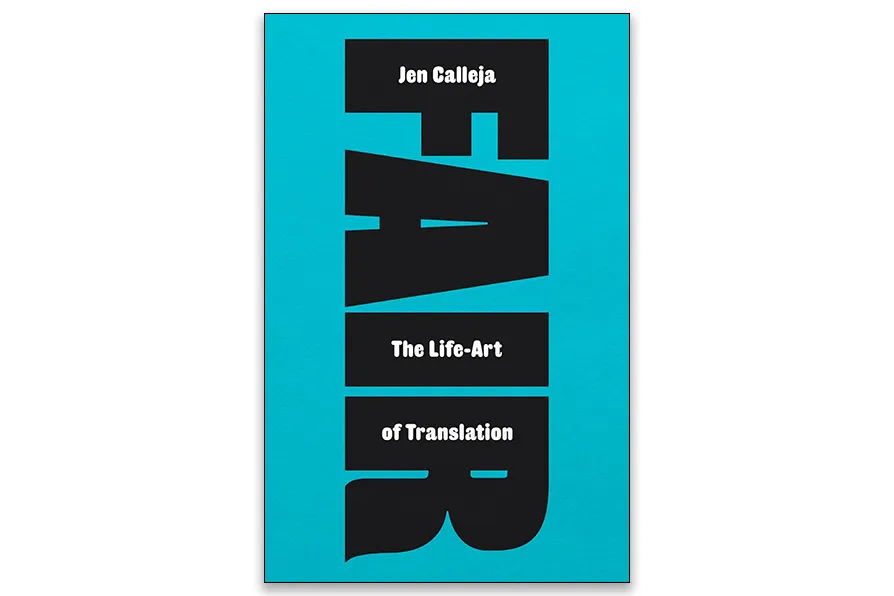ELEANOR DOBSON reflects on a stark visual record of the violent desecration of Tutankhamun’s mummified remains
KEN COCKBURN relishes the memoir of a translator, but wonders whether the autobiography underlying the impulse would make a better book


Fair: The life-Art of Translation
Jen Calleja, Prototype, £12.99
JEN CALLEJA translates from German to English, and both fiction and non-fiction. She’s pretty successful: the authors she translates include Wim Wenders and Marion Poschmann, and the books are published by the likes of Faber, Fitzcarraldo and Serpent’s Tale. But she works freelance and, as with other members of the precariat, it’s an uncertain living, with (at best) flatlining payments and no guarantee of future contracts.
Why work this way?
First, she loves doing it and second, after 15 or so years of this she can’t think what else she has the skills for.
The book is a mix of memoir, literary criticism and reflections on the nature of translation. It hops about in time and flits from the personal to the professional. We get to know her Maltese father, a car mechanic who doesn’t teach her his mother tongue, and her mother, a knitter later debilatated by mental illness. She writes of workplaces experiences, the good and bad bosses she’s had, and of drumming in a DIY punk band. She meets the writers she translates; some she becomes friends with, others anything but. Some of these passages have a real impact; the bewilderment she feels in her first job, for example, when she’s given nothing to do, then told she’s not meeting expectations.
Translation makes one thing out of another, and translators love comparing translation to other things. Calleja has fun quoting actors discussing acting, but framing what they say as if they’re speaking of translation. She also compares translators to puppeteers; we know they’re manipulating the puppets, but enjoy the illusion that the latter move of their own accord. And a text is like a recipe; each person that cooks it makes something slightly different, just as each translation of the same text varies slightly.
There’s no real sequence to any of this, but the whole is given a sort of coherence by Calleja’s central conceit that she’s leading us round “an art/book/fun fair… an epic maze of stands, stalls, booths, installations, rides, arcades.” She worked at an art fair for several years, running tours, and now regularly attends book fairs, so it’s a world she knows. What she gives us here is “a Translation Fair… themed around the life and work of a single literary translator.” The conceit works as a way of holding the disparate material together, but doesn’t gel into anything larger. By the end I had a series of individual impressions without any larger sense of what this fair might mean.
The fair imagery can also become distracting. Writing of the discrimination she faced when applying to do a Master’s, she describes a situation in which she’s offered a cup of tea. That segues into the fair where there appears “a replica of the cup of tea, but five times the size, steaming, here to the right of the gate.” The image is amusing, but weakens the impact of central point of the story.
In the chapter titled Translator Dreamhouse she writes: “I’ve been rewatching Mad Men and feeling envious of the Sterling Cooper advertising agency’s offices.” She imagines her own version where “each office contains a translator… we’d all be happy and have the upper hand through our collective power.” Unfortunately, beyond that fantasy, there’s no consideration of how that point of “collective power” might be reached, or even approached.
Towards the end, a note of defensiveness creeps in, as if the translator cannot be wrong. We hear of slapdash writers whose work the translator improves, and mistakes careless editors should have spotted. Even an acknowledged error — a tale/tail inversion — turns out to be someone’s favourite line in the whole book.
Her first translation of a novel included a rape scene, which brought back painful personal memories. She struggled with that passage, and writes that it “took 12 drafts, 12 relivings,” before she was happy with it. While the wilful haphazardness of the fair has a certain charm, I wonder if delving deeper into some of these experiences and writing about them more intentionally might have produced a book with greater impact.

ANDY HEDGECOCK relishes an exuberant blend of emotion and analysis that captures the politics and contrarian nature of the French composer

It’s tiring always being viewed as the ‘wrong sort of woman,’ writes JENNA, a woman who has exited the sex industry












